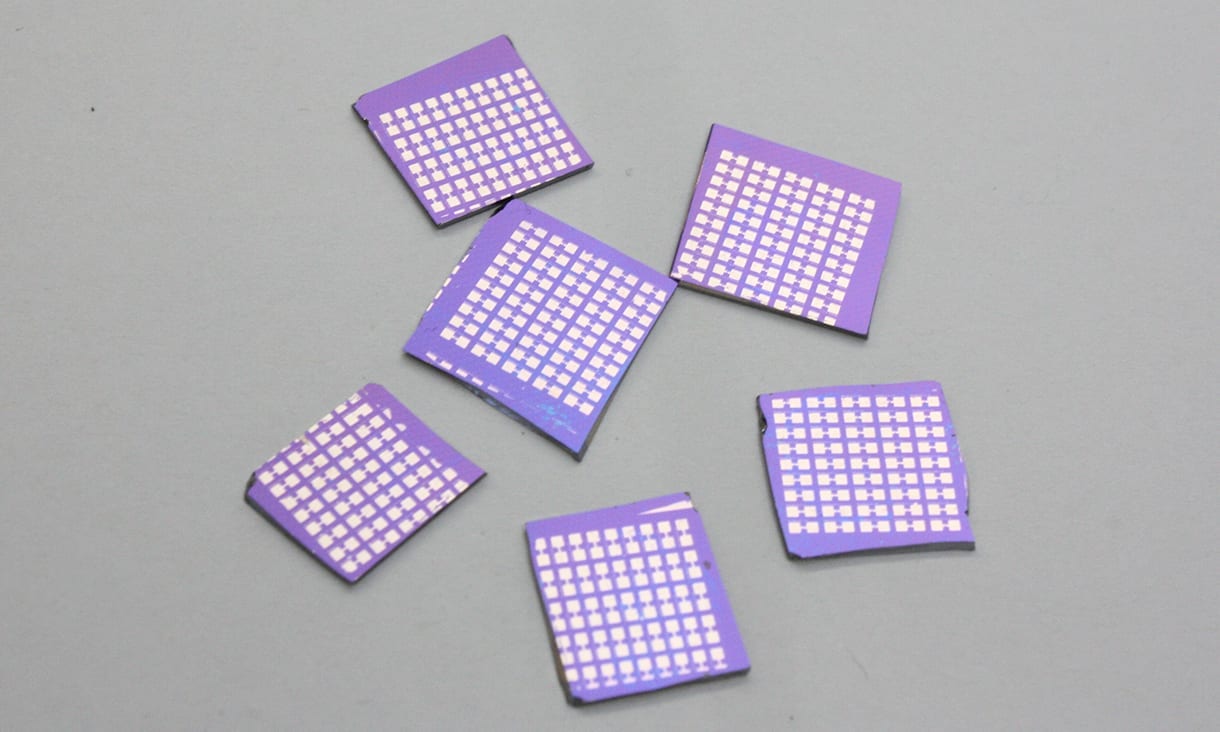
Researchers have developed the world’s first photodetector that can see all shades of light, in a prototype device that radically shrinks one of the most fundamental elements of modern technology.
Photodetectors work by converting information carried by light into an electrical signal and are used in a wide range of technologies, from gaming consoles to fibre optic communication, medical imaging and motion detectors.
Currently photodetectors are unable to sense more than one colour in the one device.
This means they have remained bigger and slower than other technologies, like the silicon chip, that they integrate with.
The new hyper-efficient broadband photodetector developed by researchers at RMIT University is at least 1,000 times thinner than the smallest commercially available photodetector device.
In a significant leap for the technology, the prototype device can also see all shades of light between ultraviolet and near infrared, opening new opportunities to integrate electrical and optical components on the same chip.
New possibilities
The breakthrough technology opens the door for improved biomedical imaging, advancing early detection of health issues like cancer.
Study lead author, PhD researcher Vaishnavi Krishnamurthi, said in photodetection technologies, making a material thinner usually came at the expense of performance.
“But we managed to engineer a device that packs a powerful punch, despite being thinner than a nanometre, which is roughly a million times smaller than the width of a pinhead,” she said.
As well as shrinking medical imaging equipment, the ultra-thin prototype opens possibilities for more effective motion detectors, low-light imaging and potentially faster fibre optical communication.
“Smaller photodetectors in biomedical imaging equipment could lead to more accurate targeting of cancer cells during radiation therapy,” Krishnamurthi said.
“Shrinking the technology could also help deliver smaller, portable medical imaging systems that could be brought into remote areas with ease, compared to the bulky equipment we have today.”
Lighting up the spectrum
How versatile and useful photodetectors are depends largely on three factors: their operating speed, their sensitivity to lower levels of light and how much of the spectrum they can sense.
Typically, when engineers have tried improving a photodetector’s capabilities in one of those areas, at least one of the other capabilities have been diminished.
Current photodetector technology relies on a stacked structure of three to four layers.
Imagine a sandwich, where you have bread, butter, cheese and another layer of bread – regardless of how good you are at squashing that sandwich, it will always be four layers thick, and if you remove a layer, you’d compromise the quality.
The researchers from RMIT’s School of Engineering scrapped the stacked model and worked out how to use a nanothin layer – just a single atom thick – on a chip.
Importantly, they did this without diminishing the photodetector’s speed, low-light sensitivity or visibility of the spectrum.
The prototype device can interpret light ranging from deep ultraviolet to near infrared wavelengths, making it sensitive to a broader spectrum than a human eye.
And it does this over 10,000 times faster than the blink of an eye.
Nano-thin technology
A major challenge for the team was ensuring electronic and optical properties didn’t deteriorate when the photodetector was shrunk, a technological bottleneck that had previously prevented miniaturisation of light detection technologies.
Chief investigator Associate Professor Sumeet Walia said the material used, tin monosulfide, is low-cost and naturally abundant, making it attractive for electronics and optoelectronics.
“The material allows the device to be extremely sensitive in low-lighting conditions, making it suitable for low-light photography across a wide light spectrum,” he said.
Walia said his team is now looking at industry applications for their photodetector, which can be integrated with existing technologies such as CMOS chips.
“With further development, we could be looking at applications including more effective motion detection in security cameras at night and faster, more efficient data storage”, he said.
The Latest Updates from Bing News & Google News
Go deeper with Bing News on:
Photodetector
- Fundamental and photodetector application of van der Waals Schottky junctions
The junction composed of traditional metals and 2D semiconductors is a key component of semiconductor devices.
- Scientists create black arsenic visible infrared photodetectors
Examples of such crystals include graphene, black phosphorus (BP), and transition metal dichalcogenides (TMDs). With their atomic thickness, high carrier mobility, and tunable bandgaps, ...
- Photonic Integrated Circuits Benefit Greatly From AI Data Center Demand, but Other Applications Are Now Emerging, Says IDTechEx
Most of the current market uses Silicon and Silica-based PICs for light propagation; however, as an indirect semiconductor, Silicon is not an efficient light source or photodetector. Therefore, ...
- Unraveling the efficiency losses and improving methods in quantum dot-based infrared up-conversion photodetectors
A new publication from Opto-Electronic Science; DOI 10.29026/oes.2024.230029 discusses unraveling the efficiency losses and improving methods in quantum dot-based infrared up-conversion photodetectors ...
- Nanophysics news
Traditional semiconductors such as Si, GaAs, and HgCdTe seem unable to meet the development trend of electronic devices that feature ultra-small volume, lightweight, and low power consumption ...
Go deeper with Google Headlines on:
Photodetector
[google_news title=”” keyword=”photodetector” num_posts=”5″ blurb_length=”0″ show_thumb=”left”]
Go deeper with Bing News on:
Broadband photodetector
- Compare broadband deals UK
There are plenty of reputable broadband providers in the UK offering competitive deals. The most popular broadband deals can be found with BT, Sky, EE, Vodafone, NOW, Gigaclear, KCOM and Zen Internet.
- Compare broadband deals
If you are looking for a new broadband deal, you’re in the right place. Our expert team has catalogued deals from a range of broadband providers, with different speeds, contract lengths and ...
- The best broadband providers in 2024, based on our annual customer survey and in-depth reviews
Want a faster, more reliable connection? We've rounded up the best broadband providers, based on our survey of thousands of customers Choosing the best broadband provider is one of the most ...
- Best cheap broadband deals in May 2024
Looking for the cheapest and best broadband deals around? Well, now is the perfect time to consider a broadband-only deal. After all, it's possible to pick up a cost-effective and reliable fibre ...
- Best Sky TV and broadband deals for May 2024
It’s fair to say that when it comes to the best broadband and TV packages, Sky is arguably the leading provider, especially here in the UK. Sky stands out for its wide choice of options on ...
Go deeper with Google Headlines on:
Broadband photodetector
[google_news title=”” keyword=”broadband photodetector” num_posts=”5″ blurb_length=”0″ show_thumb=”left”]










